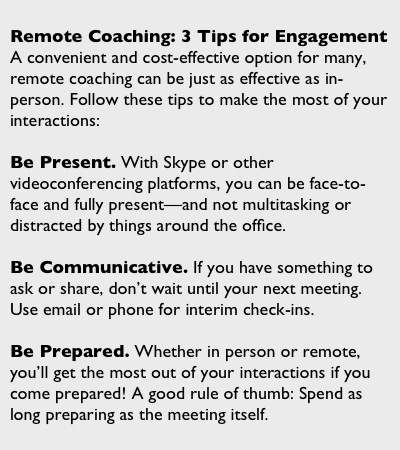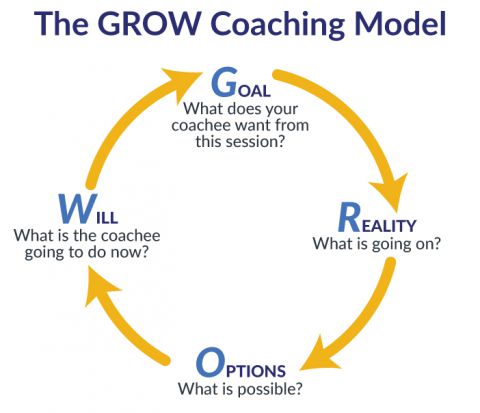Coaching: Everyone Needs a Coach
Everyone needs a coach at one time or another. Coaches are a collaborative partner, someone to bounce your ideas off of and support the achievement of your goals. Coaches hold you accountable, whether you’re on the playing field or in the boardroom.
Unfortunately, coaching is often shorted in everyday business. Employees are given some training and encouragement and expected to deliver change. Long-term change in performance and behavior does not happen simply because of training and new expectations. Constant practice, reinforcement, and accountability from a mentor or coach are also needed.
Coaching is unlocking people’s potential to maximize their own performance.
—John Whitmore
On a basic level, coaching is about developing the capabilities of employees. It is a process that fosters self-awareness, and is aimed at helping both the organization and the leader achieve business objectives while growing the leader’s competencies. Veteran coaching guru, John Whitmore explains it this way, “Coaching is unlocking people’s potential to maximize their own performance.”
Coaching 101: When, Why and Why Not
 Often the suggestion of coaching comes from a boss, deployment leader or human resources leader who is invested in developing the problem solving capability of their employees.
Often the suggestion of coaching comes from a boss, deployment leader or human resources leader who is invested in developing the problem solving capability of their employees.
You start off by defining the coaching relationship and the scope. Is the engagement in-person or remote? What are the goals of the engagement? Is anyone else mentoring the employee on this project? What is the scope of our work? Someone who is new to a problem solving methodology, for example, might have a lot of questions about tool usage and terminology, whereas more experienced problem solvers might seek assistance with dealing with complexity or advanced application, or managing change.
In any situation, a critically important part of coaching is asking questions—and listening to the answers. Asking questions provides the opportunity to look at something with an objective lens. “I don’t know many people who can be objective about their work,” said Renee Snell, Principal and professional coach at the Lean Methods Group.
What Makes a Good Coach?
“A coach helps you through a problem and gives you concrete ideas to go forward with,” said Snell. “In essence, a good coach is an objective listener.” Here are a few key aspects she offered for a positive coaching relationship:
An inquisitive approach. Although coaching sometimes involves advice, pure coaching is based on the coach asking good questions to unlock their coachee’s potential. A coach should guide you through the process, question you and make you think—but they shouldn’t do the work for you.
Shared expectations. How often will you meet? What times? What is the scope of your work? How will you communicate between meetings? It’s important to address such questions and make sure the coach and coachee share expectations about the engagement. Otherwise, frustration and conflict will ensue.
Honesty and trust. The best coaching relationships are built on honesty and trust and on the ability to show your weaknesses and ask for help. “You have to kind of be vulnerable,” said Snell, “and say I need help with this, I don’t know how to get started or I don’t know how to do this.”
Staying on Track to Reach Your Goals
Procrastination is the Achilles heel of more than a few—maybe even especially those who are high-performers. A coaching relationship by its nature creates a system where people can’t procrastinate. If you’re meeting with your coach today, you’ll get your action items done ahead of the meeting. This accountability helps keep people on track as they’re trying to complete a project, achieve certification, or reach another goal as set by the coaching team.
Snell, who has coached thousands through Lean Six Sigma certification, said the project work can be the hardest part to do on your own. Even if you have an in-house mentor, that person may be pressed for time or may not have the breadth of knowledge on tool application, project support or change management. A dedicated, experienced coach is often the difference of completing your project and certification. That’s one of the reasons that our Lean and Lean Six Sigma certification programs include six hours of mentoring through coursework, exams and project completion (more hours can be added, as needed).
A dedicated, experienced coach is often the difference of completing your project and certification.
Of course, tool application and project guidance are important, but this is really about the relationship and the support you receive. “It’s about somebody there to support you along the way,” said Snell.
How Does Coaching Work?
The type of coaching relationship will depend on the goals of an engagement. We adjust our coaching to meet specific client needs. Whether an individual or group, working on an innovation project, kaizen event or Six Sigma certification, we help people to develop their capabilities, achieve their goals and achieve long-term change for the organization.
 At the Lean Methods Group, our coaches follow a general approach that is well represented by John Whitmore’s “GROW” model.
At the Lean Methods Group, our coaches follow a general approach that is well represented by John Whitmore’s “GROW” model.
As the coaching relationship proceeds there will be a constant cycle of first establishing the goals for the session. “What do I want to improve about my performance?”
Then the cycle moves to determining what is the current reality. “What actions have I taken so far and what have been the results?”
Based upon the size of the gap, we examine further options for improvement. “What choices can I make differently?”
Finally comes determining if there is the will to push forward. It has been said that you cannot negotiate the price of success. “Will I be faithful to my plan for improvement?”
Our coaching can also take on more specific formats such as coaching with regard to the scientific method. This coaching focuses primarily on asking questions that help lead the coachee through the thinking represented by the PDSA (Plan-Do-Study-Act) cycle. Regardless of the application, the art and science of asking good questions is key.
What Does Success Look Like?
“Success is a problem solved,” said Snell. A deadline met, a savings earned, a process improved or streamlined—success will be defined differently for each coaching situation, tailored to meet the desired outcomes of the interaction. But, always, success is a problem solved.
Are You Looking for a Coach?
With years of on-the-ground experience in both industry and consulting roles, the Lean Methods Group’s coaches are expert resources in strategy, innovation, and change leadership. Since 2000, we have coached thousands of candidates to achieve certification, complete complex projects and develop their capabilities. Contact us to learn more.

